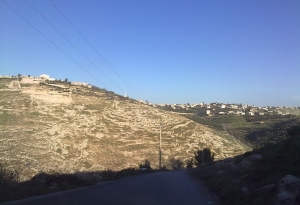I can do this. I’ve had several sessions now with fifth-graders. How much harder can seventeen-year-olds be? Besides, they’re essentially my peers. I was seventeen fairly recently!
We stare at each other for a beat too long. On one side: the American, full of bravado, or trying to appear that way. On the other: thirty pairs of eager eyes focused with rapt attention.
“So. This is the tawjihi class, right?”
There are nods and giggles. Fortunately I’ve gotten used to the notion that everything I say, in any language, is funny.
“So… okay! Tell me about what you’re learning in English!”
Heads turn; girls look at each other. I’ve seen these classes operate and I know that one or two girls will be designated the speaker through a mysterious and invisible pack process. Finally one girl says, “Miss, we don’t want to talk about English.”






